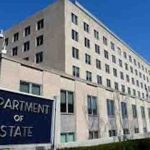ISLAMABAD 13 july (Online): A BBC investigation has found evidence showing Greek coast guard officials pressured survivors of a migrant vessel disaster that killed up to 600 people last month to name nine Egyptians on the boat as traffickers.
The nine men were detained a few days after the boat sank in the Mediterranean on June 14 off the Greek port of Pylos and have been charged with manslaughter and people-smuggling.
Doubts have been cast on the official version of events surrounding the boat’s sinking given by the Hellenic Coast Guard, however, with video footage suggesting the coast guard’s actions may have played a part in the disaster.
Court documents seen by the BBC, meanwhile, provide evidence to support claims made by survivors that some had their testimonies changed, while others were intimidated by Greek authorities.
The BBC said its evidence showed “serious discrepancies between survivors’ witness statements taken by the coastguards, and the in-person evidence later presented to a judge.” It added that a translator had also approached BBC journalists to reveal that survivors of another boat sinking last year had been intimidated by the coast guard.
The corporation said it spoke to two survivors of the tragedy, both currently in Athens, who claimed the boat sank after the coast guard attached a rope in order to tow it.
One of the men, identified as Musaab, said: “They attached a rope from the left. Everyone moved to the right side of our boat to balance it. The Greek vessel moved off quickly, causing our boat to flip. They kept dragging it for quite a distance.”
They said that after it sank, survivors were left in the water for up to two hours before they were rescued. They were eventually taken to Kalamata, where, they say, authorities told them to “shut up” about what caused the disaster.
The second man, identified as Ahmad, told the BBC: “When people replied by saying the Greek coast guard was the cause, the official in charge of the questioning asked the interpreter to tell the interviewee to stop talking.”
He added he and other survivors were told to be grateful they had been rescued and that officials had said to them: “You have survived death! Stop talking about the incident! Don’t ask more questions about it!”
The pair added they feared that if they spoke out, they would be arrested like the Egyptians and accused of being traffickers.
“If there was a fair system in place, we would contribute to this case,” Ahmad, whose brother was also on board the ship and is still missing, said.
The BBC said it had also seen evidence of oral testimony from five other survivors submitted to a court that differed from their original written statements. The original submissions, the BBC said, all failed to mention the coast guard towing the vessel. One witness statement it cited initially implied the boat capsized “suddenly” as the coast guard arrived to help.
In court, though, the same witness said: “The Greek ship tied a rope to the front of our ship and began to pull us slowly, but the rope broke. The second time they tied it up, at first we felt like we were being pulled, then our ship keeled over. The Greek ship sped up and we shouted in English: ‘Stop!’”
Despite initially denying it tried to tow the vessel with a rope, the Hellenic Coast Guard has subsequently admitted it did use one but claimed this was part of an attempt to secure and board the vessel to assess the situation.
The Greek authorities claim the nine detained Egyptians were identified by other survivors as traffickers.
Ahmad and Musaab, the two men in Athens, told the BBC the coast guard had told some passengers to blame them, with Musaab adding: “They were imprisoned and were wrongly accused by the Greek authorities as an attempt to cover their crime.”
Farzin Khavand, a translator living in Kalamata, said the story had echoes of a similar incident last year, when two Iranian men were accused of trafficking 32 people to Greece from Turkiye.
Khavand, who speaks Farsi, was involved in the coast guard investigation into what happened and said the migrants on board, all Iranians and Afghans, had told him that two Arabic-speaking men had abandoned the vessel after its engine blew up on its way to Greece.
The passengers had then taken turns attempting to steer the vessel to safety — including the two Iranians who were then accused of being traffickers.
“They (the two Iranians) were highly traumatized,” Khavand told the BBC. “They were repeating to me that they’d never even seen an ocean before they set off in Turkey. And they kept being told they were the captain (by the coast guard) and they said: ‘We know nothing about the boat. We can’t even swim.’”
Khavand said he relayed the testimonies he took accurately to the coast guard, but later, transcripts of his interviews had been changed, and he was told by other survivors that some of the migrants had been “leant on” by the coast guard to change their stories and were threatened with prison or deportation if they did not comply.
He added that one of the accused Iranians, whom he called Sayeed, had been traveling with his 6-year-old son at the time. After the case against him and his fellow Iranian collapsed, the coast guard refused to return the €1,500 ($1,676) to him it had confiscated.
“The scene ended with me thinking I don’t want to do this again because they (the Greek authorities) were not trying to get to the bottom of the truth,” Khavand told the BBC. “They were trying to pick a couple of guys and accuse them of being people smugglers.”
Local lawyer Chrysanthi Kaouni said she had seen 10 recent cases brought against people for human trafficking in Greece, which had troubled her.
“My concerns are around the translations, the way evidence is gathered and — later on — the ability of the defendants to challenge this evidence,” she told the BBC.
“Because of these three points, I don’t think there are enough safeguards according to the international law, and in the end, I don’t believe justice is done.”
The BBC cited a study carried out by the Greens/European Free Alliance group in the European Parliament of 81 trials involving 95 people between 2020-2023 that found the average trial for migrants accused of people-smuggling in Greece lasted just 37 minutes.
The average sentence for those convicted of the crime, meanwhile, was 46 years in jail, with verdicts rendered often on the testimony of a single police or coast guard officer. In over 75 percent of the cases, the accused did not appear in court.
The BBC said both the Hellenic Coast Guard and the Greek government refused to comment on its investigation.
Follow the PNI Facebook page for the latest news and updates.









